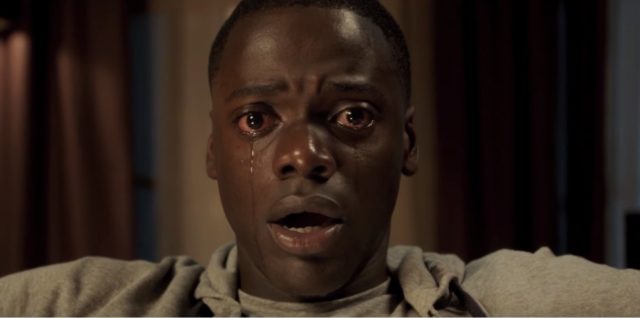
Most who have seen it wouldn’t argue with the notion that Get Out, the race-conscious indie horror movie that took the world by storm early this year, is one of the best movies of 2017. And when I say took the world by storm, I mean exactly that. Making more than $253 million on less than a $5 million budget, it’s the single most profitable movie in a year largely marked by box office duds that nobody could be bothered to see while they were in theaters.
And that’s to say nothing of how well-received the movie was by critics. It currently holds a 99% rating on review aggregator Rotten Tomatoes: an astounding feat for any movie, let alone one from the horror genre. Rival website Meta Critic gave it a score of 84. Along with its box office receipts, they paint a picture of a movie that is both deeply and widely loved by the legions of people who saw it when it first came out.

It should come as no surprise that the movie is also making a splash on the awards circuits, as nominations for various awards bodies are starting to be released. Late last month, for instance, it lead the Gotham Awards with nominations for Best Actor, Screenplay, Breakthrough Director and Feature. And, by extension, made it one of the frontrunners for this year’s Oscar ceremony.
While the movie’s multiple Golden Globe nominations were thus to be expected, one category in particular that it found itself in the running for proved to be downright bizarre. Despite its grave and serious subject matter, Get Out was nominated by the awards body for Best Musical or Comedy.

If you’re confused about why the Golden Globes evidently think that Get Out is a comedy, don’t worry. Everybody’s confused by this. Nothing about the movie was funny: neither in terms of its content nor its execution. It was a biting and timely takedown of white supremacy, cultural appropriation and the treatment of minorities by even self-effacing allies (who “voted for Obama twice” and therefor couldn’t possibly be racist).
When the movie launched, director Jordan Peele — best known as one half of the comedy duo “Key & Peele” — had reservations about boxing the movie into a particular genre. He stated that:

“The problem is, it’s not a movie that can really be put into a genre box. Originally, I set out to make a horror movie. I ended up showing it to people and hearing, you know, it doesn’t even feel like horror. It’s in this thriller world. So it was a social thriller.”
When news broke about its head-scratching miscategorization at the Golden Globes, Peele took to Twitter to call it a “documentary,” implying that there was more truth to his presentation of life in “Black America” than fancy. He later clarified that:

“The major point to identify here is that we don’t want our truth trivialized. The label of comedy is often a trivial thing. The real question is, what are you laughing at? Are you laughing at the horror, the suffering? Are you disregarding what’s real about this project? That’s why I said, yeah – it’s a documentary.”
Miscategorizing — and arguably deflating and trivializing its content — is only half the problem. Awards bodies have always tended to gravitate towards so-called “serious” movies: sobering dramas with an imposing, austere aesthetic. This is why some awards, like the Golden Globes, opt for separate categories for films outside of that narrowly-drawn mold: predominantly comedies.

The concern comes in when there isn’t room for films beyond those categories to compete for the award bodies’ top prize. And unless they add separate categories for horror movies and other genre-classifications, anything outside of “drama” and “comedy” will be hard-pressed to find a place to compete.
Say what you will about Get Out, but it is no laughing matter.
 Follow Us
Follow Us



